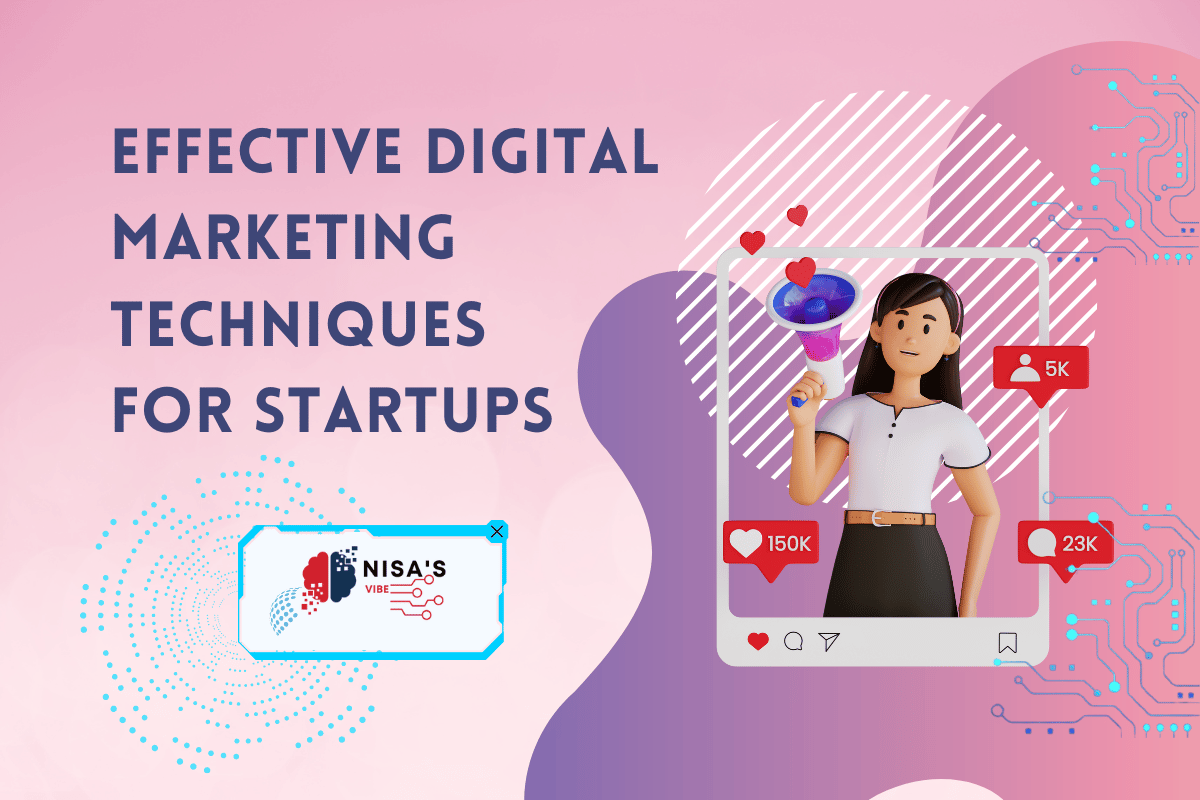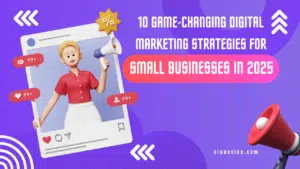Hi, I’m Nisa! As an experienced digital marketer, I’ve worked with numerous startups, helping them navigate the digital landscape to build strong online presences and drive growth. Whether you’re just starting your business or looking to optimize your current marketing efforts, digital marketing is essential for scaling your startup in 2025. This proven guide will walk you through the most effective techniques to help your startup succeed and thrive in the digital world.
1. Build a Strong Foundation with Your Website
Your website is the first impression your potential customers will have of your business. A well-designed, user-friendly website is crucial to establishing credibility and driving conversions.
Why it matters for startups:
- A professional website builds trust and makes your business appear legitimate to potential customers.
- Your website serves as the foundation for other digital marketing techniques, such as SEO, email marketing, and content marketing.
- A mobile-friendly and fast-loading website improves the user experience and keeps visitors engaged.
Tips for creating a strong website:
- Responsive design: Ensure your site looks great on both desktop and mobile devices.
- Clear calls to action (CTAs): Make it easy for visitors to take the next step—whether it’s signing up for a newsletter, scheduling a consultation, or making a purchase.
- SEO optimization: Include the right keywords, optimize your images, and use clean URLs to help your website rank higher on Google.
2. Utilize Search Engine Optimization (SEO)
Search Engine Optimization (SEO) is one of the most effective ways to drive organic traffic to your website, especially for startups with limited budgets. SEO helps you rank higher in search engine results pages (SERPs), making it easier for customers to find you.
Why it matters for startups:
- SEO drives long-term, sustainable traffic to your website.
- It allows you to target customers actively searching for your products or services.
- With proper optimization, SEO enables you to compete with larger, more established businesses in your industry.
SEO strategies for startups:
- Keyword research: Use tools like Google Keyword Planner, Ahrefs, or SEMrush to find the best keywords for your business.
- On-page SEO: Optimize your titles, meta descriptions, headers, and content to include your target keywords.
- Content creation: Regularly publish blog posts, videos, or infographics that address your audience’s pain points and provide valuable information.
3. Harness the Power of Social Media Marketing
Social media is a dynamic platform for startups to connect with their audience, share content, and promote their brand. Platforms like Instagram, Facebook, LinkedIn, and Twitter provide unique opportunities to engage with your customers and build a community around your brand.
Why it matters for startups:
- Social media allows startups to reach a wide audience and engage with customers on a personal level.
- It helps you create a community around your brand, fostering customer loyalty.
- Paid social media ads, such as Facebook Ads and Instagram Ads, are affordable and allow for precise targeting.
Social media strategies for startups:
- Consistent posting: Post regularly and maintain a consistent brand voice across all platforms.
- Engagement: Respond to comments, messages, and mentions. Show your audience that you care about their feedback.
- Influencer marketing: Collaborate with influencers in your niche to reach new audiences and gain credibility.
4. Implement Email Marketing Campaigns
Email marketing remains one of the most effective and affordable marketing tools for startups. By building an email list, you can stay in touch with potential customers, promote your products, and provide valuable content.
Why it matters for startups:
- Email marketing is one of the highest ROI marketing strategies available.
- It allows you to engage with your audience on a more personal level.
- With the right segmentation, you can send tailored offers and content that resonate with different customer groups.
Email marketing strategies for startups:
- Lead magnets: Offer free resources such as eBooks, checklists, or discounts to encourage visitors to join your email list.
- Personalization: Use dynamic content to personalize emails based on customer behavior, location, or interests.
- Automation: Set up email automation workflows to nurture leads and convert them into customers over time.
5. Leverage Content Marketing to Build Authority
Content marketing is one of the best ways for startups to position themselves as experts in their field. By providing valuable, educational content, you can attract and engage customers while boosting your search engine rankings.
Why it matters for startups:
- Content marketing helps you build credibility and trust with your audience, which is crucial for startups trying to establish themselves.
- It allows you to target long-tail keywords, which are often less competitive and more likely to convert.
- Regularly creating content helps keep your audience engaged and encourages them to return to your website.
Content marketing strategies for startups:
- Blogging: Write informative, well-researched blog posts that answer common questions or address customer pain points.
- Video content: Create explainer videos, tutorials, or behind-the-scenes content to give your audience a deeper look at your brand.
- Guest posting: Contribute articles to authoritative websites or blogs in your niche to build backlinks and increase brand visibility.
6. Invest in Paid Advertising (PPC)
While organic strategies like SEO take time to yield results, Pay-Per-Click (PPC) advertising offers quick results. With platforms like Google Ads and Facebook Ads, you can start running targeted campaigns immediately and drive traffic to your website.
Why it matters for startups:
- PPC advertising provides immediate visibility and traffic to your website.
- You can target specific demographics, behaviors, and locations, ensuring your ads reach the right audience.
- It’s budget-friendly: You can set your own budget and only pay when someone clicks on your ad.
PPC strategies for startups:
- Google Ads: Bid on keywords related to your products or services to appear at the top of search results.
- Facebook/Instagram Ads: Create highly-targeted ads based on user demographics, interests, and behaviors to drive traffic and conversions.
- Test and optimize: Run A/B tests on your ad creatives, copy, and landing pages to improve your ad performance over time.
7. Monitor Your Results and Adapt
One of the most important aspects of digital marketing for startups is measuring success. Without tracking your performance, you’ll never know if your strategies are working or where improvements are needed.
Why it matters for startups:
- By monitoring your results, you can identify what’s working and what’s not, allowing you to optimize your efforts.
- Data-driven decisions help you save time and money by focusing on the strategies that provide the best ROI.
Tools for monitoring results:
- Google Analytics: Track website traffic, conversions, bounce rates, and more.
- Social media analytics: Platforms like Facebook Insights and Instagram Analytics provide valuable data on engagement and reach.
- Email marketing tools: Platforms like Mailchimp or ConvertKit allow you to track open rates, click-through rates, and conversions.
Mastering Digital Marketing for Startup Success
In 2025, digital marketing is the key to scaling your startup and driving sustainable growth. By focusing on building a strong website, implementing SEO, leveraging social media, and experimenting with paid ads, you can effectively reach and engage your target audience.
Staying consistent, tracking results, and adapting to changes will ensure your digital marketing strategy evolves with your business. The combination of organic growth strategies and paid advertising will help you succeed and thrive in today’s competitive marketplace.




